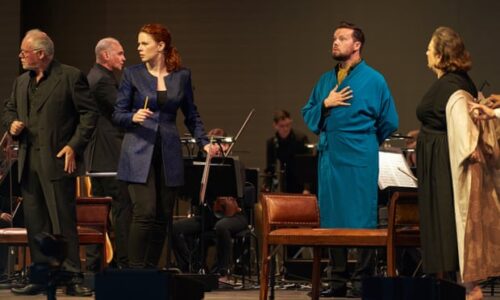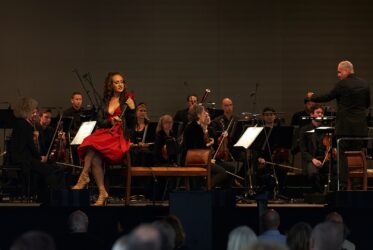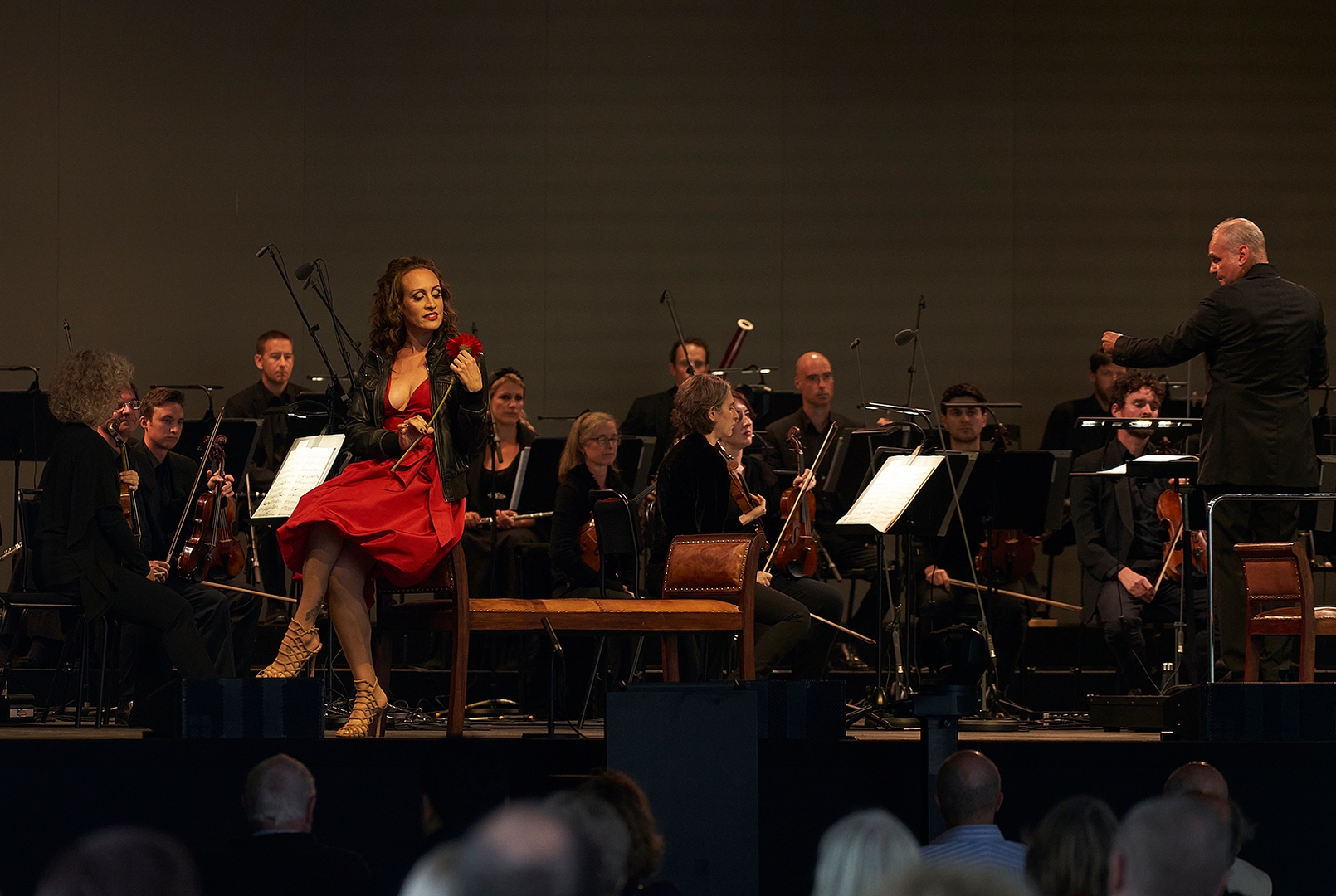
 United Kingdom Edinburgh International Festival 2021 [15] – Richard Strauss, Ariadne auf Naxos (1916 version): Soloists, Royal Scottish National Orchestra / Lothar Koenigs (conductor). Filmed (directed by Phil Glenny) at the end of August 2021 at Edinburgh Academy Junior School and streamed via ‘At Home’ (click here) from 30.8.2021. (JPr)
United Kingdom Edinburgh International Festival 2021 [15] – Richard Strauss, Ariadne auf Naxos (1916 version): Soloists, Royal Scottish National Orchestra / Lothar Koenigs (conductor). Filmed (directed by Phil Glenny) at the end of August 2021 at Edinburgh Academy Junior School and streamed via ‘At Home’ (click here) from 30.8.2021. (JPr)

Staging – Louisa Muller
Cast:
Ariadne – Dorothea Röschmann
Bacchus – David Butt Philip
Zerbinetta – Brenda Rae
Composer – Catriona Morison
Music Master – Martin Gantner
Dancing Master – Peter Bronder
Harlequin – Joshua Hopkins
Scaramuccio – Alexander Sprague
Truffaldino – Barnaby Rea
Brighella – Sunnyboy Dladla
Naiad – Liv Redpath
Dryad – Claire Barnett-Jones
Echo – Soraya Mafi
Wigmaker – Jonathan McGovern
Lackey – Ossian Huskinson
Officer – Filipe Manu
Major-domo – Thomas Quasthoff
I can never see and hear Ariadne auf Naxos without remembering how it was the first opera I saw at Covent Garden in 1978. Bacchus then was the late great British tenor Alberto Remedios who has been in my mind lately (review click here) and he was wonderful. Thomas Allen was Harlequin. (Fast-forward over 40 years and Allen was the urban narrator of The Soldier’s Tale at this year’s Edinburgh Festival click here.) In subsequent years Ariadne has been something I have been drawn back to without ever being entirely satisfied I have understood it. Of course, by streaming this semi-staged concert performance with full subtitles has enabled me to follow Strauss’s opera probably better than ever before.
As conceived originally in 1912, the opera was simply to be a 30-minute divertissement performed at the end of an adaptation by Hugo von Hofmannsthal of Molière’s play Le Bourgeois gentilhomme. Needing actors and singers was problem enough and then there was the length of the evening and the cost of putting it on in this way, so in 1916 Strauss replaced the play with a prologue. This would then explain the involvement of a commedia dell’arte troupe in the opera with a serious classical story.
The richest man in Vienna – who we never meet – is having a party and his guests will be treated to a newly composed opera: Ariadne auf Naxos of course. It is set on a desert island (Naxos), where Ariadne, a princess, has been abandoned by her lover Theseus. She is the personification of faithfulness and constancy and is pining for him and wants to die. When some nymphs announce that a stranger is approaching, Ariadne thinks it is Hermes – no not that Hermes! – who is the messenger of death. However, it is the god Bacchus who is escaping from the sorceress Circe. He is instantly infatuated with Ariadne and though she falls into his arms they never really seem to figure out who either of them actually is. As comic relief, the commedia dell’arte players have been hired to perform the farce The Faithless Zerbinetta and Her Four Lovers. The evening is to be capped off with fireworks beginning precisely at 9pm. Because dinner for the guests is running late, the Major-domo has to announce that both these entertainments must be staged simultaneously and how all involved work this out is up to them.
There is much consternation before we see a mashup performed consisting of highbrow opera and lowbrow comedy as – like tectonic plates – opera seria collides with opera buffa. Richard Strauss and his librettist, Hofmannsthal, seem to want us to ponder on what choices we would make about art, love, and fidelity. I have written before – and repeat here – how Ariadne ends with a homage to Wagner’s love duets for Tristan and Isolde and, especially, Siegfried and Brünnhilde. The opera is riddled with Wagnerian references and themes – too many for me to really detail – including mothers dying in childbirth, a magic potion, oblivion, pain and Bacchus accompanying Ariadne to the realm of death. In the end, the comedienne Zerbinetta, leader of the burlesque troupe, sticks to her own, oft-repeated, philosophy that when a woman is in love, her heart belongs completely to her man – until a new love comes along!
Edinburgh Festival’s Ariadne auf Naxos was given a socially distanced performance (overseen by Louisa Muller) in front of a socially distanced audience in the huge outdoor polytunnel at the Edinburgh Academy Junior School. Life is full of risks and why when everyone can be tested and there are other ways of proving you have some protection against coronavirus was nothing back to ‘normal’ now – on stage and off – in late August? (Also, it is sad to report there looked to be very few young people in the audience and this was also reflected in the BBC Prom I was recently at when everyone was of ‘a certain age’.)
While I know Strauss uses a much-reduced string section in this opera: the small ensemble of players from the Royal Scottish National Orchestra numbered (I counted) 35 and is apparently about right. There were several virtuosic solo contributions in a finely balanced account of an occasionally bombastic score which was conducted with authority and considerable finesse by Lothar Koenigs. However, as many times before with such reduced forces, I missed much of Strauss’s idiomatic swelling passion, rich orchestral textures and colours. On the plus side none of the singers would be battling a wave of sound which was good because – through my loudspeakers – there did not seem to be anybody who had a truly big voice.
In front of the musicians were three simple chaise longues to allow some compartmentalisation of the different toing and froing interactions of the characters in the scene-setting Prologue. There were no proper costumes and no particular dress code; though, for instance, the Music Master had a pinstriped suit; the Composer was in blue jacket and black slacks; the Wigmaker wore a pink jacket; the Dancing master had a florid shirt; and Zerbinetta wore an eye-catching scarlet dress and (faux?) leather jacket. Later there were three elegantly dressed nymphs; the comedians were either waistcoated or showing their red braces; and finally, Ariadne and Bacchus were in dark clothes as if coming to a rehearsal. Though retired from singing Thomas Quasthoff is still involved in classical music and here was the non-singing Major-domo, narrating – in a slightly humourless way it must be admitted – from the side of the stage, though I enjoyed the way he relished the word Feuerwerk (Fireworks).
Martin Gantner was a rather dour and world-weary Music Master (Strauss’s fault not his) and in her role debut flame-haired Catriona Morison was the headstrong Composer (a trouser-role) who is passionate about his composition and is indignant when initially asked to meet his patron’s demands. It is a shortish but demanding role and Morison was equal to its demands and though a little shrill to begin with was at her very best for the aria (‘Sein wir wieder gut’). Peter Bronder’s obsequious Dancing Master reminded me so much of Wagner’s Mime (a role Bronder is well known for). The burlesque quartet were well drilled and had much fun in the second half (though there was no interval) with their inflated palm trees. They were led by Joshua Hopkins as an engaging and well sung Harlequin and the nymphs (Wagner’s exact equivalent are the Rhinemaidens) were equally spirited, with Soraya Mafi particularly catching the ear as a mellifluous Echo.

For the opera-within-an-opera (where the three chaise longues are now just one) Ariadne’s two narrative arias, ‘Ein Schönes war’ and ‘Es gibt ein Reich’ are juxtaposed with the vocal fireworks of Zerbinetta’s ‘Grossmächtige Prinzessin’, the long and wittily comic exposition about the fickle nature of love. Brenda Rae was the standout singer in this Ariadne as a flirtatious, charismatic Zerbinetta with a good sense of comedy, a complete command of coloratura and no trouble reaching her aria’s stratospheric high notes.
Eventually Bacchus rescues Ariadne from her solitude and it all ends in an ardent (Wagnerian?) love duet for her saviour and her. There were also role debuts for Dorothea Röschmann (Ariadne) and David Butt Philip (Bacchus) and this demands a certain leniency in what I’ll write, which is affected anyway by not hearing them live. Phil Glenny’s camerawork was a little unforgiving and did not disguise how much of an effort Röschmann found the role. The reliable Butt Philip has a very fine sturdy voice but, for me, it does not have the heft for a heroic tenor. His opening line ‘Circe, Circe, can you hear me?’ should create a visceral effect because we should hear someone arriving at the island from a distance. Here it was as if someone had opened a door and Bacchus was just found outside. Admittedly, Röschmann and Butt Philip were more often than not on opposite sides of the platform but nevertheless it was clear there was little chemistry on show here and they sang mostly to themselves without any dramatic conviction. Röschmann’s experience shone out with the regret and heartbreak of her arias thanks to her warm, full-toned and flexible soprano. Unfortunately, her top notes were rather sketchy.
Jim Pritchard
